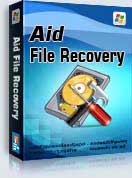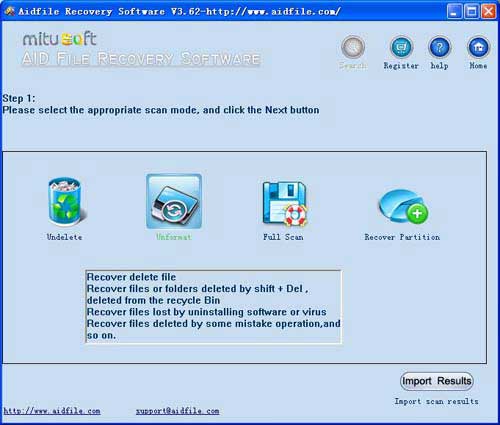SDXC memory card recovery - SDXC memory Card data recovery software to recover data from SDXC memory card (32GB 64GB 16GB 128GB 8GB 256GB 4GB 512GB 2GB 1GB 512MB 256MB) after deleted,format or lost data due to not formatted , not recognized , not working ,not showing up, power failure,logical damaged .
Use "Undelete" mode to recover deleted files from SDXC memory card quickly after Virus attack,Recycle bin clear,disk cleanup,Press shift del by mistake,permanently empty recycle bin,shift delete ,accidentally deleted by a mistake..
Use "Unformat" mode to recover files from formatted SDXC memory card after quick format,full format,accidentally formatted,reformatting,High-level formatting,Low-level formatting.
Use "Recover partition" mode to restore files if SDXC memory card partitions changed or damaged or deleted.
Use "Full Scan" mode to retrieve lost files if partitions show as "raw" or recover files which can not be found with "undelete" and "unformat" and "recover partition",rescue files from raw partition,recover files of partitons which are not NTFS,nor exfat,nor fat32 after showing an error,display as raw file system,unformatted,unknown partition,unpartitioned,needs to be formatted.
About sdxc card: The Secure Digital eXtended Capacity (SDXC) format, announced in January 2009 and defined in version 3.01 of the SD specification, supports cards up to 2 TB (2048 GB), compared to a limit of 32 GB for SDHC cards in the SD 2.0 specification. SDXC adopts Microsoft's exFAT file system as a mandatory feature. Version 3.0 also introduced the Ultra High Speed (UHS) bus for both SDHC and SDXC cards, with interface speeds from 50 MByte/s to 104 MByte/s for four-bit UHS-I bus. Version 4.0, introduced in June 2011, allows speeds of 156 MByte/s to 312 MByte/s over the four-lane UHS-II bus, which requires an additional row of physical pins. SDXC cards utilize the exFAT file system, the use of which is governed by a proprietary license, thereby limiting its legal availability to a small set of operating systems. Therefore, exFAT-formatted SDXC cards are not a universally readable exchange medium. Windows Vista (SP1 and later) and OS X (10.6.5 and later) support exFAT out of the box. (Windows XP and Server 2003 can support exFAT via an optional update from Microsoft.) Most BSD and Linux distributions do not, for legal reasons; users must manually install third-party implementations of exFAT (as a FUSE module) in order to be able to mount exFAT-formatted volumes.[16] However, SDXC cards can be reformatted to use any file system (such as ext2, UFS,[disambiguation needed] or VFAT), alleviating the restrictions associated with exFAT availability. Nevertheless, in order to be fully compliant with the SDXC card specification, many SDXC-capable host devices are firmware-programmed to expect exFAT on cards larger than 32 GB. Consequently, they may not accept SDXC cards reformatted as FAT32, even if the device supports FAT32 on smaller cards (for SDHC compatibility). Therefore, even if a file system is supported in general, it is not always possible to use alternative file systems on SDXC cards at all depending on how strictly the SDXC card specification has been implemented in the host device. This bears a risk of accidental loss of data, as a host device may treat a card with an unrecognized file system as blank or damaged and reformat the card. The SD Association provides a formatting utility for Windows and Mac OS X that checks and formats SD, SDHC, and SDXC cards.Data recovery is a process of salvaging inaccessible data from corrupted or damaged secondary storage, removable media or files, when the data they store cannot be accessed in a normal way. The data is most often salvaged from storage media such as internal or external hard disk drives (HDDs), solid-state drives (SSDs), USB flash drives, magnetic tapes, CDs, DVDs, RAID subsystems, and other electronic devices. Recovery may be required due to physical damage to the storage device or logical damage to the file system that prevents it from being mounted by the host operating system (OS).
SDXC cards: PNY Elite Performance 64 GB High Speed SDXC Class 10 UHS-I, U3 up to 95 MB/Sec Flash Card (P-SDX64U395-GE); SanDisk SDSDUNC-064G-GN6IN 64GB SDXC UHS-I Memory Card; PNY Elite Performance 256 GB High Speed SDXC Class 10 UHS-I, U3 up to 95 MB/Sec Flash Card (P-SDX256U395-GE); PNY Elite Performance 64GB High Speed SDXC Class 10 UHS-I Flash Card - P-SDX64U1H-GE; SanDisk 64GB Class 4 SDXC Flash Memory Card- SDSDB-064G-B35; Transcend 64GB SDXC Class 10 UHS-1 Flash Memory Card Up to 45MB/s (TS64GSDU1E); Lexar Professional 1000x 128GB SDXC UHS-II/U3 Card LSD128CRBNA1000; SanDisk Extreme PRO 128GB UHS-I/U3 SDXC Flash Memory Card SDSDXPA-128G-G46; SanDisk Extreme PRO 64GB UHS-I/U3 SDXC Flash Memory Card SDSDXPA-064G-X46; Patriot LX Series 256GB High Speed SDXC Class 10 UHS-1 - Up to 70MB/sec Flash Card - PSF256GSDXC10; Transcend 64GB SDXC Class 10 Flash Memory Card Up to 30MB/s (TS64GSDXC10E); Sony 16GB SDHC/SDXC Class 10 UHS-1 R40 Memory Card (SF16UY/TQMN); SanDisk Extreme SDXC UHS-I/U3 64GB Memory Card Up To 90MB/s Read (SDSDXNE-064G-GNCIN); Lexar Professional 633x 64GB SDXC UHS-I/U3 Card LSD64GCBNL633; Sony 64GB Class 10 UHS-1 SDXC up to 70MB/s Memory Card (SF64UY2/TQ); Transcend 128GB SDXC Class 10 Flash Memory Card Up to 30MB/s (TS128GSDXC10E); SanDisk Extreme PRO SDSDXPA-064G-X46 SDXC Flash Memory Card; PNY Elite Performance 256GB High Speed SDXC Class 10 UHS-I Flash Card - P-SDX256U1H-GE; Transcend 128GB SDXC Class 10 UHS-1 Flash Memory Card Up to 90MB/s (TS128GSDXC10U1); ADATA Premier 64GB SDHC/SDXC UHS-I U1 Memory Card (ASDH64GUICL10-R); Lexar Platinum II 200x 128GB SDXC UHS-I Flash Memory Card LSD128BBNL200; SanDisk Extreme 64GB UHS-I/U3 SDXC Memory Card Up To 60MB/s Read-SDSDXN-064G-G46; SanDisk Ultra 64GB Class 10 SDXC Memory Card Up To 40MB/s-SDSDUN-064G-G46
Aidfile Recovery Software Keyfeature
support FAT32 EXFAT and NTFS file system
Windows 10,Windows XP, Windows 7, Windows 8,Windows 8.1, Windows Vista, Windows 2003, 2008, 2012.
MS Office document (Word, Excel, PowerPoint, Outlook) types (doc, docx, ppt, pptx, xls, xlsx, pst, etc.),photos (JPG, PNG, ICON, TIF, BMP, RAF, CR2, etc.), videos and audios (MPG, MP4, MP3, MTS, M2TS, 3GP, AVI, MOV, RM, RMVB, etc.), compressed files (rar, zip, etc.), PE files (exe, dll, lib, etc.) and so on.

